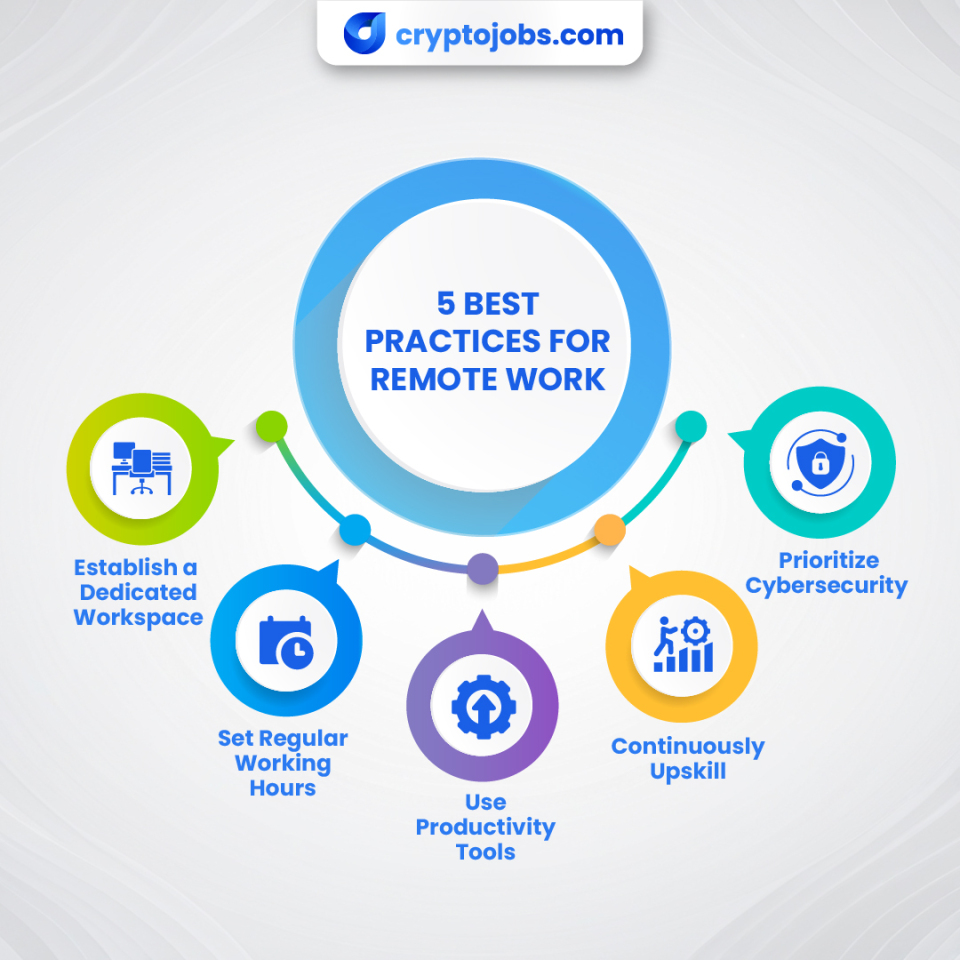
5 Best Practices for Remote Work in the Web3 Industry
- cryptojobs.com
- August 28, 2024
- All Posts, Career Guide, Web3
- Web3
- 0 Comments
Remote work has become immensely popular in the Web3 industry. According to a report by Buffer, 98% of professionals would like to work remotely, at least part-time. Whether as a developer, marketer, or project manager, remote work allows for flexibility and creates opportunities to work with teams based anywhere around the world.
The Web3 industry and its global reach have fostered a remote-first work culture. 16% of global companies are already fully remote and operating without a physical office. In fact, the computer and IT sectors emerged as leaders in remote work in 2024. While remote work has created more opportunities for the Web3 talent pool to fully embrace and explore their professional growth, navigating the unique challenges and opportunities presented by remote work in this industry requires a specific set of best practices that should be adopted at all costs.
This blog will delve into best practices for maximizing productivity, maintaining collaboration, and ensuring a successful remote work experience within the dynamic Web3 ecosystem.
Are you a talented professional looking to find your dream remote job in the Web3 industry? Look no further; register with cryptojobs.com today to find the most sought-after opportunities.

1. Establish a Dedicated Workspace
An assigned workspace or office is important for staying focused and productive when working from home. Avoid using your bed or couch to conduct business; this will only encourage you to become lazy during your working hours. You don’t need to designate a whole room; just set up a simple, quiet nook with a chair, a desk, and everything else you will require.
Having a dedicated workspace helps you mentally separate work from leisure, making it easier to switch into “work mode” and stay on task. It also helps remind others in the household that you are working and can help curtail interruptions. In the Web3 industry, where work involves solving complex problems that may take a considerable amount of time, the ability to concentrate is critical. Hence, it is especially important to have a workspace that supports this focus.
A study by Buffer reported that 22% of remote workers struggle to unplug after work. Having a specific office area for work may assist with setting up boundaries between work and home, promoting work-life balance.
2. Set Regular Working Hours
While remote work provides flexibility, it is very important to establish a regular working schedule to prevent burnout. Without a strict schedule, you might work too hard or too little, both of which are bad for productivity and can lead to significant delays. Maintain discipline during working hours so that little time is wasted throughout the day. Gallup analytics revealed that 53% of employees consider improved work and personal life balance as well as employee well-being as “very important” when seeking employment. This balance can be achieved through regular hours.
Setting a routine allows you to distinguish between work time and free time, so there are no difficulties in decompressing after the working day. It also assists you in conveying your availability to the rest of the team, making the flow of operations seamless. This may come in handy in the fast-paced Web3 industry, where projects can quickly roll out. Fixing your working hours enables you to stay organized and keep up with the demands of your role.
3. Use Productivity Tools
Productivity tools allow you to manage your work effectively and efficiently while ensuring good cooperation with your team. Project management tools, time-tracking applications, and communication tools are resources that assist you in planning, scheduling, and interacting with other employees.
Instant messaging and collaborative project tools such as Slack and Trello make work easier by providing an easy way of communicating progress and changes. You can also use time management tools that may help with schedules and decide which tasks truly need your attention and the amount of time that should be given to them. As Web3 projects are usually large-scale and may involve numerous participants, project management tools are essential to ensure the productivity and progress of all projects.
4. Continuously Upskill
The Web3 space is constantly evolving, with new technologies and developments every other day. To stay competitive and grow in your career, you need to continuously upskill. This means dedicating some time to learning new tools and knowledge, understanding emerging trends, and deepening your knowledge in areas relevant to your role.
Whether you master a new programming language, understand new blockchain advancements, or master DeFi, staying up-to-date with your skills secures your position as a professional and a valuable member of your team.
Furthermore, upskilling may help maintain one’s interest and productivity when working from home, where professional development options may be more limited compared to traditional offices. The Society of Human Resource Management report revealed that 76% of workers would remain with their companies longer if the organizations provided continuous learning opportunities, proving the importance of lifelong learning.
5. Prioritize Cybersecurity
When it comes to remote work, particularly in the Web3 industry, cybersecurity should be of the highest importance. According to a report from Cybersecurity Ventures, cybercrime will cost the world $10.5 trillion annually by 2025. Dealing with sensitive information and or working with blockchain technology demands heightened security measures for your data as well as that of your company.
Remember to implement secure connections where necessary, use strong passwords, and work with two-factor authentication wherever possible. Never use any public Wi-Fi unless you’re connected via a VPN, and remain cautious of phishing scams or any other threats. Enhancing your knowledge of current cybersecurity best practices is also important because threats change often. By prioritizing cybersecurity, you secure your work and protect yourself and the company from potential risks.
The Bottom Line
Remote work in Web3 can be very flexible and provide many opportunities for growth, but to be productive and efficient, it takes much self-discipline and the knowledge of how to do things correctly. Setting up a proper home office, having working hours, applying organizational software, always learning, and being diligent about cybersecurity are the keys to a successful remote work routine. Following these best practices will ensure that you remain attentive, effective, and protected as you interact within the ever-evolving Web3 landscape.
Finding Web3 jobs in the competitive web3 space can be stress-free with cryptojobs.com, as top Web3 and crypto companies trust the platform for hiring the best talent. Start your job search today and find a position that matches your skillset.




